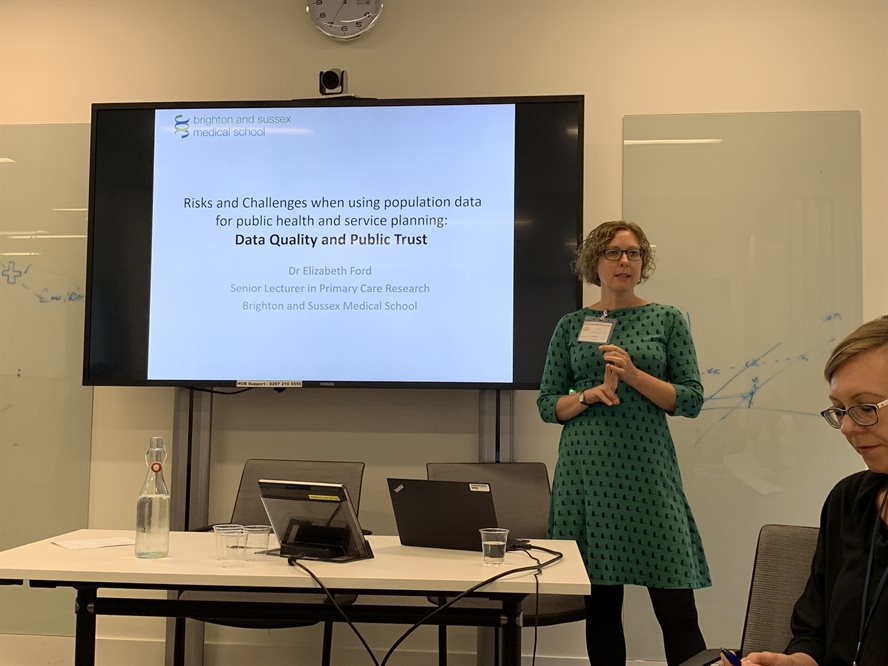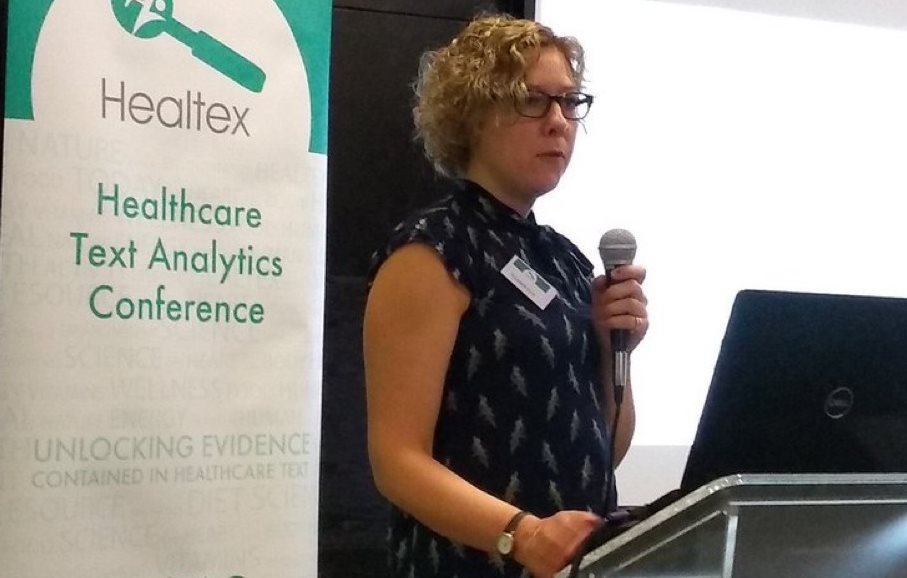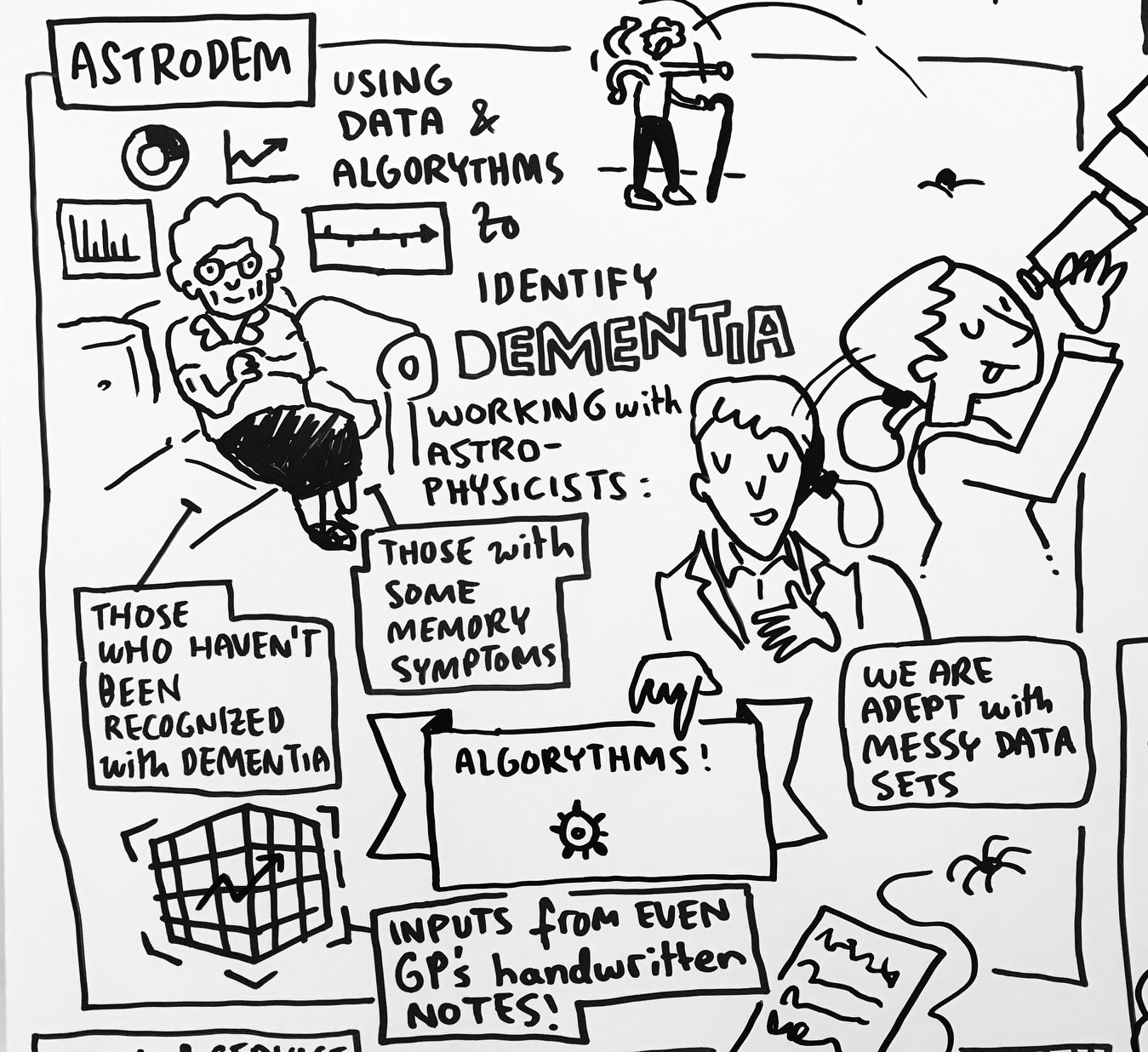Presentations and talks
13 January 2021
Liz Ford gave a presentation entitled Can we use digital technology to detect or predict dementia, and if we can, should we?, at an online seminar discussing Computing Applications in Digital Health, hosted by the University of Brighton Research Centre for Secure, Intelligent and Usable Systems.
15 October 2020
Liz Ford described the Astrodem study at a seminar called Applications of Machine Learning to Improve Healthcare Delivery for Older Adults, which was hosted by the US National Institute on Aging (NIA) Division of Behavioral and Social Research (BSR), part of the US National Institutes of Health. The meeting focuses on identifying research gaps and opportunities of how researchers can apply machine learning approaches to improve health care delivery for older adults.
11 February 2020
Liz Ford gave a presentation at the Brighton and Hove meeting of the University of the Third Age. Liz’s talk spanned describing electronic patients records, how they are used for research, the ethics of this, and how the Astrodem team have used these records for research on dementia.
23 October 2019
Liz Ford gave a presentation about research using electronic health records, including results from Astrodem, at the Brighton Digital Festival Event called DATA HEALTH AND THE ARTS: Creating space, bridging boundaries.
7 October 2019
Liz Ford gave a talk to about research using electronic health records, including results from Astrodem, at the Brighton and Hove Ageing Well Festival at the event Age-Friendly Coffee and Converation – Health and Social Care.
2 October 2019
Liz Ford gave a talk at an event run by Zinc, a social enterprise dedicated to addressing some of society’s most pressing challenges by fostering innovation. Zinc has a mission-led approach and Liz presented on results of the Astrodem study to spark ideas for the “Five healthy extra years in later life” theme.

16 September 2019
Liz Ford gave a presentation at the Department of Health and Social Care at a workshop organised by the Open Innovation Team at the Cabinet Office on methods and ethics of Population Segmentation. Liz presented on the ethics of using patients’ NHS electronic patient data for population based research and on data quality issues with this data.
28 March 2019
Dr Liz Ford and colleague Dr Lamiece Hassan from University of Manchester and HDR-UK ran a public engagement event at the Alan Turing Institute on developing trustworthy data governance standard for the use of medical free text in research. See Lamiece’s blog about the data govenance event here >
24 April 2019
Dr Liz Ford recently chaired a panel session at the 2019 Healthcare Text Analytics Conference in Cardiff, entitled 'Ethics and Governance in text mining for trustworthy health research: progress and opportunities.'

19 October 2018
Astrodem team member Johannes Starlinger has written an article about AI and precision medicine on the website dataconomy.com.
6th September 2018
Liz Ford presented the ASTRODEM project at the Team East Sussex Ageing Society Meeting held at the University of Sussex. Team East Sussex (TES) is the local federated board for the South East Local Enterprise Partnership (SELEP). Membership of Team East Sussex is made up of business, local authority, social enterprise and education representatives from across the county.Presentations and discussions at the meeting were captured by a cartoonist, and ASTRODEM was captured as shown.

19 June 2018
Liz Ford was invited to speak at Sussex Impact Day 'Breakfast with Impact - Spark your Curiosity'. Among other speakers from the University of Sussex, and introduced by the Vice-Chancellor Prof Adam Tickell, Liz spoke about the Astrodem project in a talk entitled 'Using astrophysics to close the diagnosis gap for dementia'.
24-26 April 2018
Several members of the Astrodem team attended the Medical Informatics Europe Conference 2018, Gothenburg, Sweden, 24-26 April. Dr Phil Rooney presented his paper entitled 'Modelling uncertainty in diagnoses in UK primary care records: development of a method using probabilistic programming with Bayesian priors'. Dr Liz Ford presented her paper entitled 'Development of a model for finding unlabeled cases of rheumatoid arthritis in UK primary care patient records'.
18-19 April 2018
Several members of the Astrodem team attended the UK Healthcare Text Analytics Conference (HealTAC), Manchester 18-19 April. On Wednesday 18 April, Shanu Sadhwani presented her paper entitled 'Understanding underdiagnosis: The potential contribution of free-text to dementia research'. On Thursday 19 April, Dr Liz Ford chaired a panel discussion entitled 'Understanding how to gain public trust in healthcare text analytics'.
30 January 2018
On 30 January 2018, we held a public event to discuss people’s opinions about sharing their medical records for research. This well attended event was run in conjunction with Healtex and attendees discussed the perceived privacy risks of sharing the 'free text' portions of their medical record as well as the coded information.
7 November 2017
Liz Ford was invited to speak at the Science Match Future Medicine conference in Berlin. In a three-minute talk, Liz presented the aims, objectives and preliminary results of the Astrodem project.
7 September 2017
Dr Liz Ford contributed to the British Science Festival event 'Improving the quality of life for people with dementia' together with Prof Sube Banerjee (BSMS) and Dr Penny Dodds (University of Brighton). From astrophysicists using theories on galaxy discovery to help GPs spot people at risk of dementia, through to PARO, a robotic baby seal designed to help those with it, this event explored what living well with dementia looks like and how society and services can contribute.
6 September 2017
Shanu Sadhwani chaired a symposium at the Division of Health Psychology Annual Conference, Cardiff, entitled 'Helping carers to care: Supporting the formal and informal carers of people with dementia', and presented her first PhD study 'Stigma, Nihilism and Uncertainty: GP barriers to diagnosing dementia. A qualitative study'.
19 July 2017
Dr Philip Rooney and Dr Liz Ford visited CPRD to present two talks, entitled 'Under-diagnosis of mental health conditions in general practice' and 'Understanding the True Correlation Between Conditions Using Electronic Health Records and Probabilistic Programming'.
12 July 2017
Shanu Sadhwani presented at the Society of Academic Primary Care Annual Conference in Coventry, results from her first PhD study, entitled 'What shapes GPs decisions to pursue a diagnosis of dementia? A qualitative study'.
11 July 2017
Liz Ford gave a presentation to the Institut für Informatik at Humboldt-Universität zu Berlin, Germany, detailing the aims and preliminary results of the Astrodem project. Liz spent two days in Germany working with Dr Johannes Starlinger, to set up a collaboration in which Dr Starlinger will help the Astrodem team to define longitudinal predictors of dementia, by clustering patients who have similar patient pathways. During this time, Drs Ford and Starlinger also visited Doc-Cirrus, a tech company developing and providing software to GPs in Germany, to learn more about how to develop our predictive models in a way in which they can be quickly implemented in GPs’ clinical workflow.
9 May 2017
Sussex Data Analysis Forum. Dr Elizabeth Ford, "Forming collaborations in health data science and understanding health data". Liz talked about the history of the Astrodem project and what data analysts need to know if they want to work with routinely collected health data in mental health.
28 April 2017
NIHR day at University of Sussex: What can the NIHR do for you? With chief scientist Chris Witty. Dr Elizabeth Ford presented on "Health Informatics Research at Brighton and Sussex Medical School", including presenting the aims of the Astrodem project.
25 April 2017
Informatics for Health 2017, Manchester UK. Conference of the Farr Institute and the European Federation for Medical Informatics. Dr Elizabeth Ford, "Which variables are useful for phenotyping dementia in primary care records? A meta-analysis". Presented in the session "Electronic Phenotyping."
24 April 2017
Informatics for Health 2017, Manchester UK. Conference of the Farr Institute and the European Federation for Medical Informatics. Dr Philip Rooney, "Understanding the True Correlation Between Conditions Using Electronic Health Records and Probabilistic Programming" presented in the session "Machine Learning."
28 March 2017
Sussex Data Analysis Forum. Dr Philip Rooney, "Applying Probabilistic Programming Techniques to Electronic Health Records."
30 March 2017
MQ Mental Health Research Charity Data Science Event, Manchester, UK. Dr Elizabeth Ford was invited to speak on "Challenges and Opportunities using Primary Care Data for Mental Health Informatics" and presented some preliminary findings from the Astrodem project.